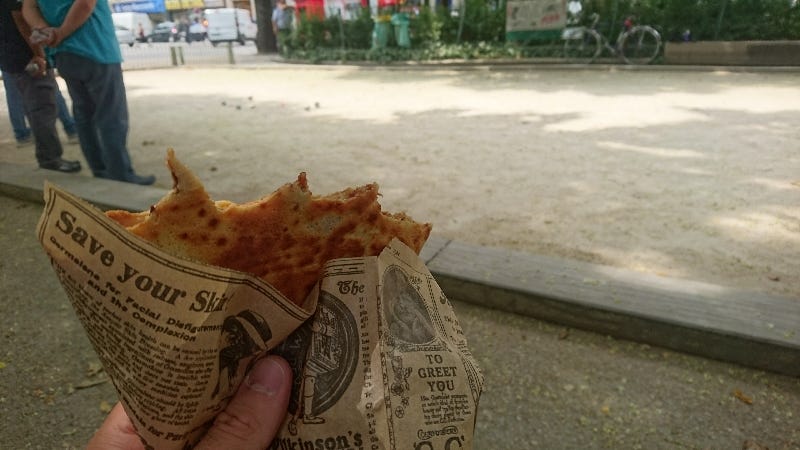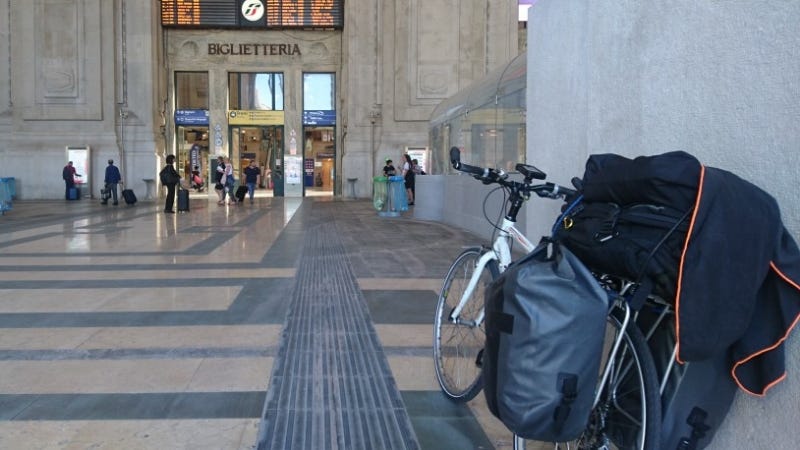#84: Standing on the Lecce Express

Happy Friday!
This email is coming to you LIVE from the Milan-Brindisi train. Currently paused at Trinitapoli, where the air smells of rain and the clouds are ripped from oil paintings. Somewhere over there is the Adriatic, across which (with any luck) I shall be sailing tomorrow evening.
The man opposite me, in shirt sleeves and eyebrows, is eating one of those doughnut-shaped apricots, bringing the sharp tang of Italian soil and sunshine to the carriage.
The first half of the journey from Milan was uncomfortable at best: my reservation plonking me between a corpulent man with a breathing difficulty and a middle-aged woman who, through no fault of her own, obstructed me from both my baggage and a longing sense of freedom. She appeared to understand, despite our lack of common language, and offered me a chocolate.
I was therefore quite grateful when two apparently healthy (and selfish) males ejected from their seats a pregnant Frenchwoman and her young daughter, giving me the gentlemanly excuse of surrendering my disquieting seat to the mother. It was more pleasant to stand and watch Italy unroll itself before the window.
From Foggia onwards, however, the train emptied out and I secured this space at a table for four. Me and my apricot eating companion can admire in peaceable silence the olive groves outside, with ample elbow room.
Today is the last of three consecutive train journeys that have taken me and my bicycle 1,400 miles from London St Pancras, through Gare du Nord and Gare de Lyon, to Milano Centrale and now Puglia.
To those who wonder why I couldn't simply fly, I have no particular response. But perhaps a young Belgian I met in the Eurostar departures lounge put it best: 'This is travel from the heart.'
I suspect, were his grasp of English more idiomatic, he would have said, 'This is travel for travel's sake' - but I like his formulation better.

Milano Centrale, with bike.
>> INPUT
Not much to link to this week due to an excess of running around. The last few days have been notable for:
Crêpes.
Four different editions of Go Sport in Paris, on the hunt for a housse transport vélo.
Insufficient sleep.
Budweiser from Vincent the Belgian and...
Baklava from Saffina - thank you!
OUTPUT >>
As you may have noticed, this mailing list is the engine room of my blogging. Here's some you might have missed:
...COMING UP...
The rest of my train to Brindisi. I'm making huge progress with Anna Karenina!
Tonight with Dario, my WarmShowers host.
Tomorrow night aboard the ferry.
Sunday-Wednesday: a brisk 210km cycle to Athens all along the Gulf of Corinth.
Now On: The Victor Frankl 5-a-day Book Club!
Membership Criteria: Read 5 pages a day of Man's Search for Meaning to complete the whole darn text in only 28 days. I'll be tootling through the text at just 5 pages a week, so you've got plenty of time to catch up.
Day 10, p55-60
Today's pages start with what must be one of the most shockingly apposite analogies in literature.
'[A] man's suffering is similar to the behaviour of gas. If a certain quantity of gas is pumped into an empty chamber, it will fill the chamber completely and evenly, no matter how big the chamber. Thus suffering completely fills the human soul and conscious mind, no matter whether the suffering great or little. Therefore the "size" of human suffering is absolutely relative.'
The choice to use 'gas' for the metaphor is both macabre and entirely fitting.
Under different circumstances Victor Frankl's relativist stance could be mocked, but born as it was from the most abject of experience, it carries instead enormous moral and historical weight.
The relativism of suffering finds its parallel in that 'a very trifling thing can cause the greatest of joys' - such as the 'dance of joy' when he and his fellow inmates realised they were not bound for a concentration camp with a gas chamber, but 'only' for Dachau.
'Small mercies' were a cause to give thanks: one was considered lucky if one avoided a violent foreman, a dangerous job, or were able to work inside a factory instead of out in the cold.
But these relative pleasures provided only 'a kind of negative happiness'. When Frankl drew up a 'balance sheet' of 'real positive pleasures', he could count only two in many weeks.
Many years after his release from Auschwitz, Frankl was shown a magazine photograph of unwell prisoners in a concentration camp sick bay. The person showing him the photograph remarked on how 'terrible' it looked. But Frankl was confused - why?
He remembers his experience of spending 4 days in the sick bay - and how content he was, how glad to be sick, and 'happy in spite of everything'. Those 4 precious days when he did not have to work himself to death in a snowstorm were 'a lifesaver'.
'When I explained, my listeners understood why I did not find the photograph so terrible: the people shown on it might not have been so unhappy after all.'
---
Share your thoughts by replying to this email. We will continue next week...
Much love,
- dc
CREDITS
David Charles wrote this. David is currently gallivanting around Europe and will be talking to refugees in Greece. He is also co-writer of BBC Radio sitcom Foiled, does copywriting for The Bike Project and is almost always available for work. davidcharles.info // @dcisbusy

Jupiter. Via Kottke.org.


